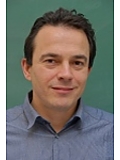Systems Biology for tissue engineering of mesenchymal stem cells: Integrating novel experimental methods and mathematical models. Subproject
Projektleiter:
Finanzierung:
Bund;
The project addresses the development and integration of new experimental and theoretical tools to elucidate and consequently predict quantitatively mechanisms of adult stem cell differentiation subject to mechanical, biochemical and physical stimuli of the matrix. The ultimate aim is to apply the generated knowledge and established tools for tissue engineering of human mesenchymal stem cells (MSC) as a source for cartilage and bone replacement in regenerative medicine.
The project will combine High Throughput Screen (HTS) quantitative experimental methods, advanced material science technologies and high end tissue engineering with systems theory, mathematical modelling, continuum biomechanics and molecular simulation. The mathematical models of the signal pathways and the advanced continuum models that render the anisotropic mechanical force distributions impacting on the differentiating cells during tissue formation will provide a basis to guide and complement the experimental strategies. For this purpose new experimental methods will be developed for delivering the large data sets which will correlate defined extracellular biochemical and mechanical signals presented to MSC with responses of MSC in a quantitative manner. Therefore, a particular focus will be on the design of an extracellular environment which mimics the physiological context of stem cell renewal and differentiation systematically on the basis of cell biochips. The Biochips will be combined with optical microscopy for automated High-Throughput-Screens (HTS) of cell responses to systematically variation in presentation of biochemical and mechanical signals to cells. The obtained data sets will be the bases for identifying and finally predicting cell signalling pathways for MSC differentiation with the help of systems theory. Altogether, with the techniques developed, methods to determine optimum conditions for MSC proliferation and differentiation, respectively, should become available. In a more general perspective, the HTS quantitative experimental tools and mathematical models established will be of broad applicability for basic cell biology research and systems biology approaches on questions relating to, but not only, cell adhesion and differentiation. Moreover, as a further innovation, the project will provide both experimental and mathematical tools to assess the impact of mechanical forces on cell differentiation and their integration into models describing conventional, i.e. ligand induced signaling cascades. In this regard, systems biology acts as a key player in bridging the gap between the subcellular scale and the continuum approaches on cell/tissue level. As a long term goal, we plan to exploit the results for large scale osteogenic and chondrogenic precursor cell production suited for clinical application.
The project will combine High Throughput Screen (HTS) quantitative experimental methods, advanced material science technologies and high end tissue engineering with systems theory, mathematical modelling, continuum biomechanics and molecular simulation. The mathematical models of the signal pathways and the advanced continuum models that render the anisotropic mechanical force distributions impacting on the differentiating cells during tissue formation will provide a basis to guide and complement the experimental strategies. For this purpose new experimental methods will be developed for delivering the large data sets which will correlate defined extracellular biochemical and mechanical signals presented to MSC with responses of MSC in a quantitative manner. Therefore, a particular focus will be on the design of an extracellular environment which mimics the physiological context of stem cell renewal and differentiation systematically on the basis of cell biochips. The Biochips will be combined with optical microscopy for automated High-Throughput-Screens (HTS) of cell responses to systematically variation in presentation of biochemical and mechanical signals to cells. The obtained data sets will be the bases for identifying and finally predicting cell signalling pathways for MSC differentiation with the help of systems theory. Altogether, with the techniques developed, methods to determine optimum conditions for MSC proliferation and differentiation, respectively, should become available. In a more general perspective, the HTS quantitative experimental tools and mathematical models established will be of broad applicability for basic cell biology research and systems biology approaches on questions relating to, but not only, cell adhesion and differentiation. Moreover, as a further innovation, the project will provide both experimental and mathematical tools to assess the impact of mechanical forces on cell differentiation and their integration into models describing conventional, i.e. ligand induced signaling cascades. In this regard, systems biology acts as a key player in bridging the gap between the subcellular scale and the continuum approaches on cell/tissue level. As a long term goal, we plan to exploit the results for large scale osteogenic and chondrogenic precursor cell production suited for clinical application.
Anmerkungen
SysTec-Verbundprojekt MSC
Schlagworte
Mathematische Modellierung und Analyse, Optimal Treatment Design, Systembiologie, Systems Biology, Target Identification
Kontakt

Prof. Dr.-Ing. Rolf Findeisen
Otto-von-Guericke-Universität Magdeburg
Fakultät für Elektrotechnik und Informationstechnik
Institut für Automatisierungstechnik
Universitätsplatz 2
39106
Magdeburg
Tel.:+49 391 6718708
weitere Projekte
Die Daten werden geladen ...

